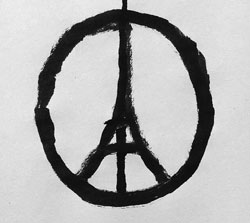According to BBC, over 129 lay dead and many more injured in Paris after the latest and most devastating attacks to be attributed to the Islamic State in Iraq and Syria to date.
Compounding this shocking attack were the string of bombings in Baghdad, Iraq and Beirut, Lebanon, once known as the “Paris of the Middle East,” which killed and injured hundreds last week just prior to the Paris attacks.
According to Russian President Vladimir Putin, the downing of the Russian airliner over the Sinai Peninsula in Egypt last month could be easily forgotten in this maelstrom, but was also an unequivocal act of terrorism,
Twin explosions that killed nearly 100 in the Turkish capital Ankara on October 10 during a rally for peace were never claimed by IS, however it is speculated their complicity resulted in this massacre as well.
“They’re becoming bold in their outward attacks against any civilization they perceive as un-Islamic,” said Monmouth University graduate student, Bryan Larco. “It’s time to strike back lest they believe they can attack again with impunity.”
In a similar retaliatory act to that of the U.S. in the aftermath of 9/11, France, already an active participant in the war on terror, unleashed air strikes on the ISIS capital of Raqqa, Syria.
Although the efficacy of the airstrikes has yet to be determined, it has been postulated that this unilateral action taken by France may be used later to invoke a multilateral European response through Article 5 of the North Atlantic Treaty Organization (NATO), according to The Washington Post.
This deterrent allows any attack on a NATO member to be perceived by all as an attack on the whole, which may prompt certain member states that have not yet been overt in the global fight against terrorism (like Germany) to step up their involvement. Our own strategy for dealing with IS will admittedly undergo “intensification,” said President Obama during a conference in Turkey on Monday.
“I think article 5 of NATO should be utilized in the same context that it was used after 9/11,” said Tyler, a recent Monmouth graduate referencing the only instance that the United States and its European allies have utilized the clause.
 “We need a dedicated international coalition to defeat ISIS, and it would be ideal to include our allies in the region. However, Arab armies are not always the best trained, disciplined or dedicated. The Obama administration and some Republicans’ plan to arm ‘moderate Syrian rebels’ has utterly failed and we need to go back to a plan that works. Unfortunately, the world will need to stabilize the region long term because we have seen how regional instability can spill into the international sphere,” said Vandergrift.
“We need a dedicated international coalition to defeat ISIS, and it would be ideal to include our allies in the region. However, Arab armies are not always the best trained, disciplined or dedicated. The Obama administration and some Republicans’ plan to arm ‘moderate Syrian rebels’ has utterly failed and we need to go back to a plan that works. Unfortunately, the world will need to stabilize the region long term because we have seen how regional instability can spill into the international sphere,” said Vandergrift.
While the combined allied forces could theoretically wash Syria and Iraq in fire, cleansing these lands of ISIS and their brand of violent extremism with it, President Obama has maintained the need for moderate Sunni factions to serve as the point of attack against violent extremism, with the U.S. and other allies serving in a supplementary leadership role.
This strategy, like any, has its detractors. Professor of Political Science Dr. Saliba Sarsar, however is not one of them.
“[America’s] outreach necessitates a strong focus on educating for pluralism and peaceful coexistence, public diplomacy, socioeconomic development, etc. The Paris tragedy might prod countries to strengthen their intelligence and military efforts against terror, but what is equally important is their commitment to extract the roots of terror and create a more equitable and healthy world that gives priority to human security, dignity, and hope,” said Sarsar.
Much ado has also been made over President Obama’s, and even more recently, former Secretary of State and Democratic Presidential Candidate Hillary Clinton’s refraining from calling IS fighters “radical Islamists.”
“We should not shy away from calling a spade a spade, said Sarsar. “What happened in the Sinai, Ankara, Baghdad, Beirut, and Paris are criminal and sinful acts carried out by Islamic extremists. These are not the exception, however. Many a culture and religion have radicals who twist their faith traditions to serve their narrow ideological proclivities and agendas.”
Key Muslim leaders, such as the President of the Palestinian Authority, Mahmoud Abbas, and Iranian President Hassan Rouhani have condemned the Paris attacks.
“We must remain diligent and use a multi-pronged strategy to help neutralize extremism and radicalism, while we reach out to allies and others to promote awareness and understanding,” said Sarsar.
Image taken from leanon.org and BBC News




